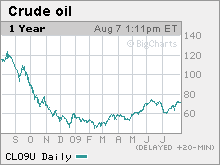Wall Street weakness dings oil
Crude futures fall, tracking softer stocks as the dollar drifts higher.
NEW YORK (Reuters) -- Oil prices dipped Monday, tracking modest Wall Street losses on the eve of a meeting of the U.S. Federal Reserve, and after OPEC's president said current prices are "not bad."
U.S. crude fell 33 cents to settle at $70.60 a barrel Monday after spending much of the day in positive territory.
"The petroleum markets continue to lack a clear price direction as traders are seemingly waiting for trends in the recently correlated U.S. dollar and equity markets to become clear," said Tim Evans, energy analyst at Citi Futures Perspective in New York.
Stocks were slightly weaker on profit-taking, while the dollar rose against other currencies. Over the past several months, oil prices have tended to track equities markets while moving opposite the greenback.
The U.S. Federal Reserve meets Tuesday and Wednesday, amid expectations it is ready to start raising interest rates. Dealers said the meeting, along with a slew of economic indicators toward the end of the week, could be pivotal to the direction of oil prices.
Oil's losses came after OPEC President Jose Botelho de Vasconcelos said prices are not bad at current levels -- a signal that the cartel is unlikely to cut output at a meeting next month.
OPEC has already agreed to cut some 4.2 million barrels per day from the world market since last September to counter slumping prices and demand in the economic slowdown.
OPEC kingpin Saudi Arabia appears set to keep oil supplies to Asian, European and U.S. customers unchanged in September, according to market sources.
Adding some support, the U.S. National Hurricane Center said a low pressure system southwest of the Cape Verde Islands could develop into the first tropical cyclone of the Atlantic hurricane season.
Tropical storms and hurricanes can impact energy supplies by shutting down offshore platforms and coastal refineries. ![]()


